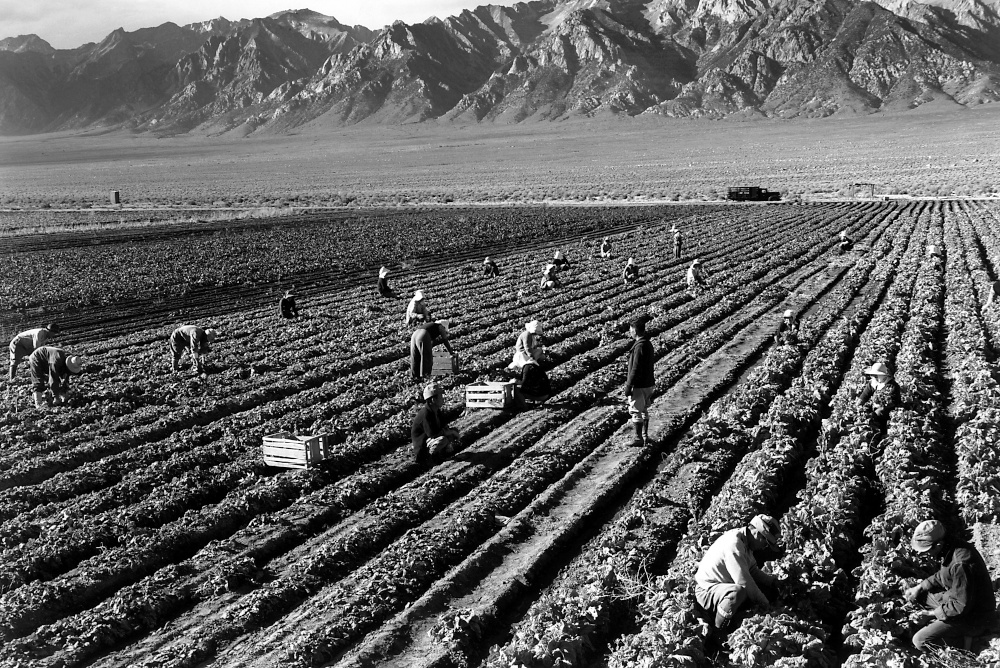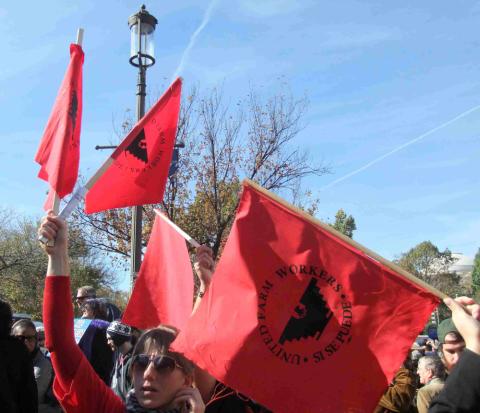
Farm workers in the fields near Mt. Williamson at Manzanar Relocation Center, California. (Wikimedia Commons/Ansel Adams)
Fifty years ago, my Chicano sisters and brothers shared their struggle for dignity with me — over two weeks — that I'll never forget.
I was a 33-year-old Catholic sister attending an Ignatian symposium in San Francisco. Throughout the conference, we were challenged to look at our following of Christ as costing something, leaving our comfort zone, being changed.
A surprising intervention in the program occurred when Cesar Chavez, founder of the United Farm Workers asked to speak to the audience. His quiet composure and committed Christian presence altered the energy in the room. His question: could some of us join him on a picket line, possibly risking arrest?
After prayerful consideration and checking it out with my leadership, whose response was "no," (they were not against supporting Cesar but thought my first obligation was to the eight-day retreat I was expected to do) I felt my heart open to follow Christ, regardless of the outcome. My schedule allowed me to participate for a weekend and soon, I joined others standing in the fields across from the Gallo vineyard near Fresno. I was shocked at seeing Teamster enforcers on the opposite side of the road holding rubber hoses, lead pipes and crowbars over the heads of Filipino workers who could not even look at us.
We had been given an option: if you were willing to go to prison, the longest time anyone had been held was two or three days — and that fit my schedule. Choosing to risk possible arrest, I joined the line in the fields, where it was over 100 degrees before 8 a.m. Chanting, singing, praying under the banner of Lady of Guadalupe had a profound effect on me; non-violence meant confronting armed thugs, whispering the rosary, weak in the knees with fear and exhaustion.
Advertisement
Within four hours, police came and read us "the riot act" in Spanish and English, demanding that "we disperse as so ordered" and accusing us of starting a riot. Then we were arrested for breaking an unjust law stipulating that no person could stand next to another person to form a picket line.
I was relieved to be arrested (able to sit down in a bus!). There were 53 of us — 34 Chicano women, three laywomen from Protestant churches, and 16 sisters. We were taken to the Fresno County Industrial Farm. Our unexpected arrival meant previous occupants were moved quickly, leaving a mess in restrooms and the single dormitory.
Dorothy Day was with us and gave us sisters "Jail 101," encouraging us to clean up the prison, decorate it with whatever we had in our purses, (e.g. dental floss holding brown paper towels with words like, "Hope, Healing, Peace" written in lipstick and hanging from the light fixtures). Bunk beds with no privacy lined both sides of our new "home" and the heat was melting us into oblivion.
Our brief weekend turned into two weeks, with two rides to the courthouse to be released, only to have the bus turn around and bring us back to an uncertain future. We were finally released on the third trip at midnight, on the morning of Aug. 15, 1973.
This experience taught me how vulnerable our Hispanic sisters and brothers are, how corrupt our "judicial system." I knew in theory, but found the practice totally disregarded the law.
What impressed me most was the racism that our Chicano sisters and brothers live with: their insecurity as migrant workers, their fears for their families, their livelihood, and their deep faith in Our Lady of Guadalupe.
Almost immediately we decided to take turns praying through the night. Our "altar" was a central picnic table, with a copy of the bible in Spanish and English, and a small "holy card" of Our Lady of Guadalupe, which someone had "framed" in a shiny silver gum wrapper. Hour by hour, two people would pray in silence during the long hot nights of our two-week vigil. I still remember the strength of "presence" as we sat in silence, sometimes watching tears stream down my Chicana partner's cheeks as she worried about her husband, (many spouses were also in prison supporting the UFW) her children, no income, threats to their homes and loved ones. Their wisdom and strength left a deep respect in my heart.
A week after we arrived, we were told that we could meet with a lawyer who would help us get out on "our own recognizance." To avoid the monotony of the endless days and nights — even though none of us wished to get out on our own recognizance — most of the sisters agreed to meet privately with the lawyer.

United Farm Workers with flags at a 2010 rally (Wikimedia Commons/Martha Soukup)
A well-spoken man, dressed in suit and tie, invited each of us to meet with him, asking what we later found out was a bogus set of questions: "Do you live alone or in community?" "Are you gainfully employed or working for a group?" We learned later that each question had a number of points attached to it: if you lived alone you got five points, but if you lived in community, (i.e. hippies!) you got only one point. If you worked for the church rather than for a corporation, you got fewer points. None were deemed worthy of being let out of prison on our own recognizance.
Another example of surprise was food. One afternoon after lunch, one of our members discovered empty cans of dog food in the dumpster. No wonder that "rice and beans" had a different taste!
On our second trip to the courthouse, I was riding in the bus next to Dorothy Day. To make conversation, I was asking folks what their favorite scripture quote was. I'll never forget Dorothy's response: in her brusque manner she almost shouted out, "Is there any other? Nothing is impossible with God" (Luke 1:37)!
One day, when I felt overwhelmed and discouraged, my mother called with what she said was good news: "I've talked to the sheriff and he's a good Irish Catholic, and he will release you." My phone time was up, and I thanked her and ended the call. Another call that dreadful day was from my leadership, telling me how wrong I had been to get arrested, knowing I was missing giving some retreats. I went outside for our 15 minutes of daily exercise, lay down on the grass behind the prison curled in the fetal position, asked Mother Earth to hold me, and cried into the dry grass. Even now as I write this, I feel the energy of that embrace. It sustained me then and continues to do so.
When I got home my dear friend, our provincial leader, told me she had marched with Cesar during the Leadership Conference of Women Religious meeting in Washington, D.C. My mother insisted on taking me to a small cannery near my home where she proudly introduced me to some of the migrants working there.
I went outside for our 15 minutes of daily exercise, lay down on the grass behind the prison curled in the fetal position, asked Mother Earth to hold me, and cried into the dry grass.
In the months and years that have followed those memorable two weeks with the United Farm Workers, my naivete regarding our political system has had a reality check. People of color throughout this country face such inequities and still they move forward, raising their families, contributing to their neighborhoods and churches, building community that strengthens the fabric of this country, waiting for folks like me to recognize our racism and help change unjust systems.
As a Nun on the Bus, I met a Latino realtor who said that so many immigrants were afraid of deportation that they rarely bought their own homes, though they have the savings for a down payment. "However," he said, "If the United States were ever to have a comprehensive immigration law that remained stable, we would have a housing boom in this country unlike anything we've seen before."
Fifty years later, I believe the embrace of Mother Earth, as I anguished with the United Farm Workers under the banner of Our Lady of Guadalupe, was my "Si, Se Puede" moment. It energized me to shout with Dorothy Day, "Nothing is impossible with God!"





